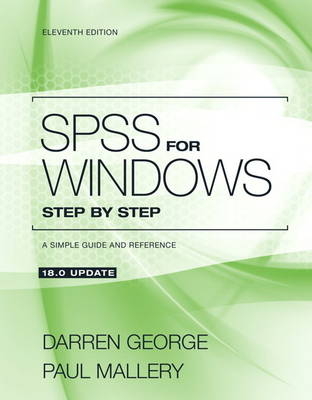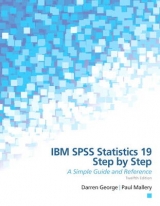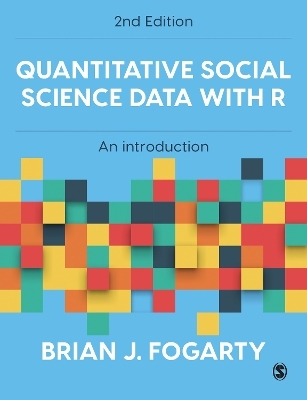
SPSS for Windows Step by Step
Routledge (Verlag)
978-0-205-01124-7 (ISBN)
- Titel erscheint in neuer Auflage
- Artikel merken
Makes data analysis and SPSS procedures clear and accessible by presenting straightforward step-by-step instructions in each analysis chapter to clarify procedures. Hundreds of screen shots and step-by-step boxes guide the student through the program. All of the datasets used in the book are available for download online at www.pearsonhighered.com/IRC. Exercises at the end of each chapter give students an opportunity to practice using SPSS. Updated to reflect SPSS Version 18.0.
Darren George, Darren’s academic background includes a B.A. from Pacific Union College (triple major of math, history, religion), an M.A. from California State University, Fullerton (Experimental Psychology) and a Ph.D. from UCLA (Personality and Social Psychology with a minor of Measurement and Psychometrics). He is a tenured professor of Psychology at Canadian University College in Lacombe, Alberta, Canada. His specialties include data analysis using SPSS software and marital compatibility. In the latter category Darren has co-authored a bestselling book with his wife Elizabeth on marital compatibility called The Compatibility Code. He is father of three adult children, Marcus an aerospace engineer; Melody, a film producer; and Robin, an animator with Rhythm and Hues. He was a nationally ranked runner in the ’70s (2:20:10 marathon) and is an avid trombonist and pianist. Paul Mallery, Associate Professor at LaSierra University Dr. Mallery joined the LSU faculty in 1993, and completed his Ph.D. from UCLA in 1994 in Social Psychology, with a minor in Political Psychology. His research focuses on intergroup relations, primarily social comparisons in intergroup settings, and prejudice. In addition to numerous conference presentations, he has co-authored two textbooks (published by Wadsworth and Allyn & Bacon) on the SPSS statistical package. Dr. Mallery is extremely engrossed with work and research. He has published an article in the Journal of Social Psychology entitled, "Controllability, Anger, Judgements and Valence of Attributions for Civil Unrest."
1. An Overview of SPSS for Windows Step-by-Step
2. SPSS Windows Processes: Mouse and keyboard processing, frequently-used dialog boxes, editing output, printing results, the Options Option
3. Creating and Editing a Data File
4. Managing Data: Listing cases, replacing missing values, computing new variables, recoding variables, exploring data, selecting cases, sorting cases, merging files
5. GRAPHS: Creating and editing graphs and charts
BASE SYSTEM MODULE
6. FREQUENCIES: Frequencies, bar charts, histograms, percentiles
7. DESCRIPTIVE Statistics: Measures of central tendency, variability, deviation from normality, size, and stability
8. CROSSTABULATION and Chi-Square (2) Analyses
9. The MEANS Procedure
10. Bivariate CORRELATION: Bivariate correlations, partial correlations, and the correlation matrix
11. The T TEST Procedure: Independent-samples, paired-samples, and one-sample tests
12. The One-Way ANOVA Procedure: One-way Analysis of Variance
13. General Linear Models: Two-Way Analysis of Variance
14. General Linear Models: Three-Way Analysis of Variance and the influence of covariates
15. Simple Linear REGRESSION
16. MULTIPLE REGRESSION ANALYSIS
17. NONPARAMETRIC Procedures
18. RELIABILITY ANALYSIS: Coefficient alpha () and split-half reliability
19. MULTIDIMENSIONAL SCALING
20. FACTOR analysis
21. CLUSTER ANALYSIS
22. DISCRIMINANT ANALYSIS
ADVANCED and REGRESSION MODULES
23. General Linear Models: MANOVA and MANCOVA: Multivariate Analysis of Variance and Covariance
24. General Linear Models: Repeated-Measures MANOVA: Multivariate Analysis of Variance with repeated measures and within-subjects factors
25. LOGISTIC REGRESSION
26. Hierarchical LOGLINEAR MODELS
27. General LOGLINEAR MODELS
28. RESIDUALS: Analyzing left-over variance
Data Files
Glossary
References
Index
| Erscheint lt. Verlag | 10.12.2010 |
|---|---|
| Verlagsort | New York |
| Sprache | englisch |
| Maße | 276 x 215 mm |
| Gewicht | 768 g |
| Themenwelt | Schulbuch / Wörterbuch |
| Geisteswissenschaften ► Psychologie | |
| Mathematik / Informatik ► Mathematik ► Computerprogramme / Computeralgebra | |
| Sozialwissenschaften ► Soziologie | |
| ISBN-10 | 0-205-01124-1 / 0205011241 |
| ISBN-13 | 978-0-205-01124-7 / 9780205011247 |
| Zustand | Neuware |
| Informationen gemäß Produktsicherheitsverordnung (GPSR) | |
| Haben Sie eine Frage zum Produkt? |
aus dem Bereich



